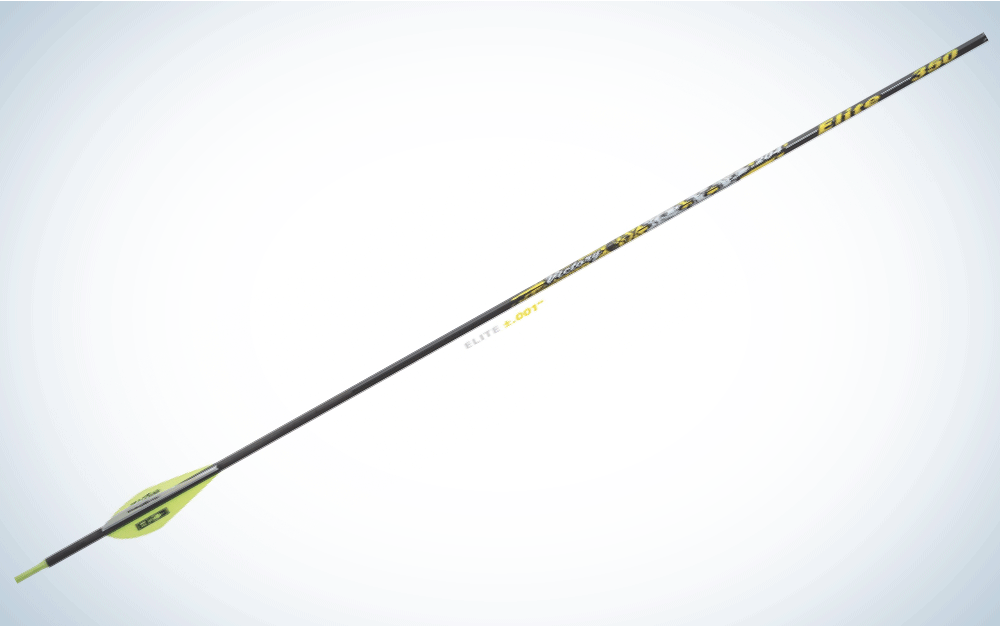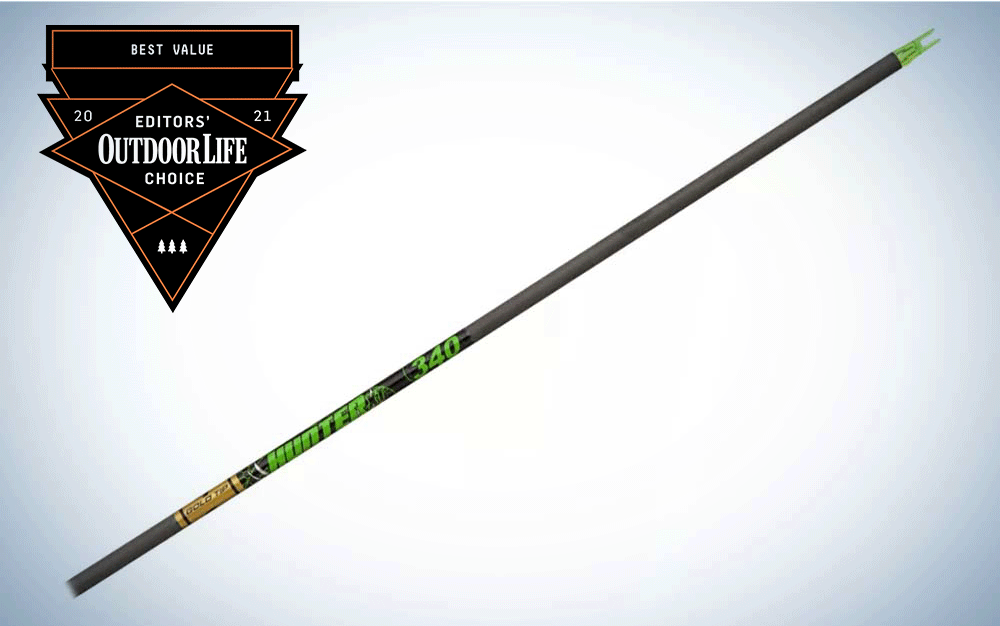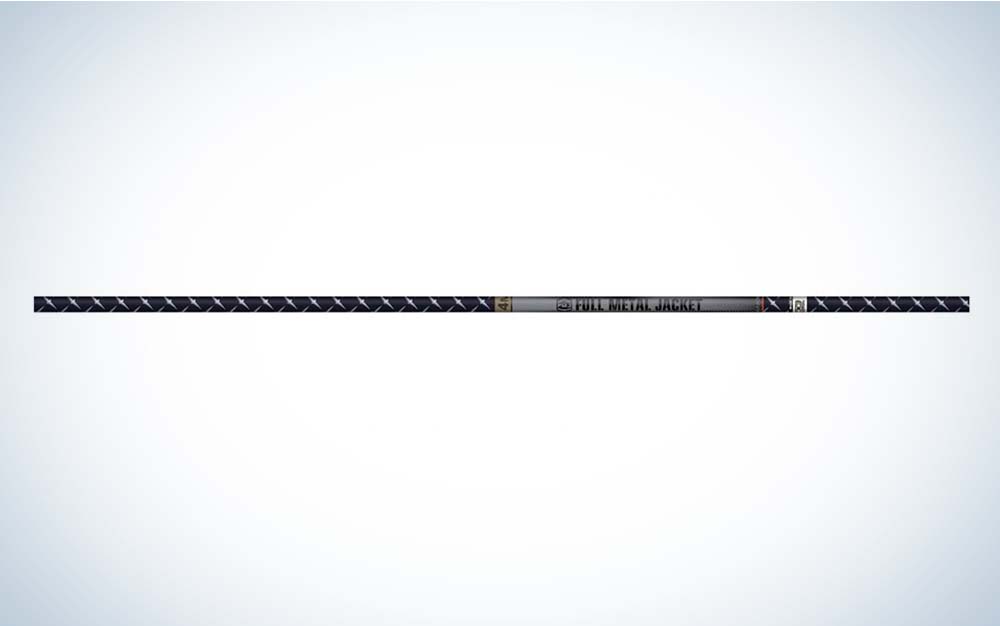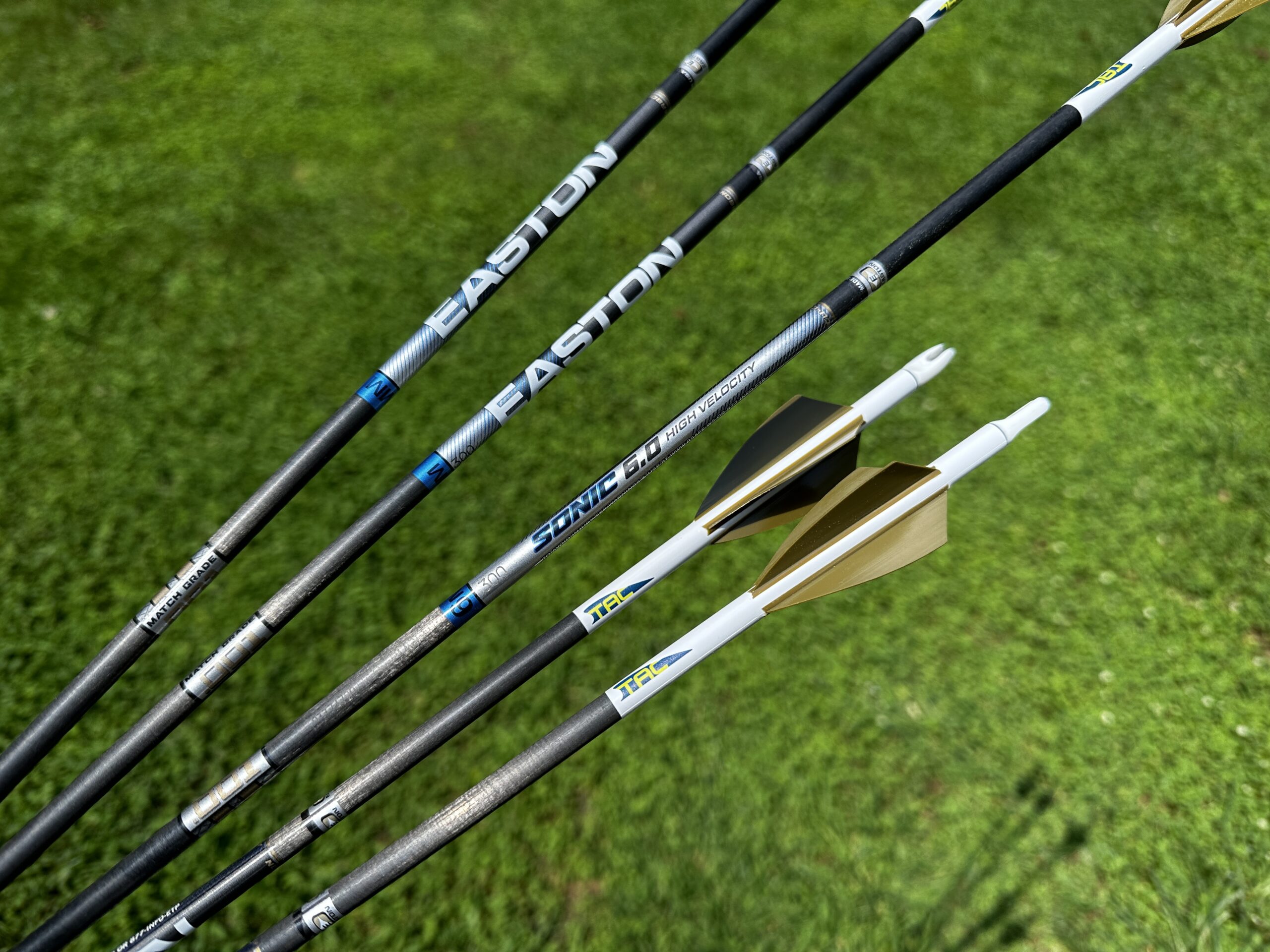We may earn revenue from the products available on this page and participate in affiliate programs. Learn More ›
Written By
P.J. Reilly
Updated Aug 9, 2023 3:11 PM
The search for the best hunting arrow is a quest where the quarry can seem more elusive than a 200-inch whitetail or 400-inch bull, because the choices are endless. Easton or Gold Tip? Micro diameter or fat arrow? Heavy or light? Affordable or car-loan expensive?
In bowhunting, the arrow is as important a piece of equipment as you will carry afield. I mean, the arrow does the dirty work. The bow is worthless without it.
Oftentimes, however, bowhunters put more thought into their boots, their bow sight, their release, (insert any other piece of bowhunting equipment here), than they do their arrows. They head to the arrow display at the local big box store, and grab the ones that have the coolest fletchings and graphics.
I thought about what motivates discerning bowhunters to pick the arrows they shoot and broke it down into five basic categories. Then, I picked what I consider to be the best in each category to come up with:
As I reveal my picks for the best hunting arrow in each category, let’s talk about each to determine why it’s a bowhunting concern, and what ultimately makes a quality arrow within that group.
Best Hunting Arrows: Reviews and Recommendations
Best Hunting Arrow: Easton 5mm Axis
Key Features
- .003 Straightness and .001 straightness available
- Micro diameter
- Durable
Let’s be honest here. A majority of bowhunters in the world probably like to keep things as simple as possible. They’re going to favor having one arrow for all their hunting adventures.
Whether they’re chasing elk out West, whitetails in the East, caribou up North, or impala in Africa, they’d like to have one arrow to do it all. That way, there’s no need to tune the bow every time they switch arrows. There’s no need to make a new sight tape for their single-pin sights. And there’s no need to start practice from ground zero time and again to understand the performance of each different arrow. If I shoot the same arrow with a 100-grain point all year long, I’m going to have great confidence in that setup no matter what I’m hunting.

The best arrow for hunting is one that stays in the middle of the road in all the performance characteristics. It’s not too heavy, nor is it too light. It’s not the skinniest arrow on the market, nor is it the fattest. It’s going to offer decent speed, but it’s not considered either fast or slow. It’s got to be durable and somewhat affordable.
If there is such a thing as THE perfect arrow, the Easton 5mm Axis might be it. It’s an all-carbon arrow with a 5mm outside diameter. A 300-spine shaft weighs 10.7 grains per inch. There are less expensive versions of this arrow with a straightness tolerance of .003 inches, and more costly, match grade versions with a tolerance of .001 inches.
So we are talking about a small diameter carbon arrow that weighs a fair amount. This is an arrow you’ll be able to shoot long range in the wind. Or you can shoot it at 15 yards from a tree stand. You can hunt moose or antelope with an Easton Axis arrow. This is an arrow that will take a beating, and still get the job done.
Easton makes a variety of point inserts for the 5mm axis, so you can get the front end of the arrow to perform the way you want. You can choose between aluminum or brass HIT inserts, or aluminum or stainless steel half-outs. These will allow you to beef up the arrow’s F.O.C. for long-range accuracy or hard-hitting penetration, or keep it at a minimum to maintain speed.
And the Easton 5mm Axis won’t break your bank account. At Lancaster Archery Supply, the bare shaft, .003 version of this arrow costs $10.50. The match-grade .001 version costs $12.17. Neither is at the top of the price sheet.
It’s hard to find a shaft that’s the best hunting arrow for deer and the best hunting arrow for elk. But, the Easton Axis pulls double duty better than any arrow I’ve tested. Also, if you pair it with Iron Will impact collars you’ll have a durable arrow you can use for many seasons.
Key Features
- .001 Straightness
- Micro diameter
- Carbon fiber
Product Description
Something that makes the world an incredible place is the diversity of the landscape. The average shot taken at whitetails by tree-stand bowhunters in the thick woods of my home state of Pennsylvania is no farther than 20 yards. The spot-and-stalkers out West in the vast expanses of Utah, New Mexico or Nebraska, however, often make sure they have accurate sight references out to 120 yards. I’ll bet dollars to donuts a Utah muley hunter is not shooting the same arrow as me.
When it comes to long-range shooting, you want an arrow that is super straight. For sure, you can spin test arrows and cut off wobbly ends to make nearly any arrow as straight as another. But that job is a whole lot easier when the straightness tolerances are as tight as possible.
A small shaft diameter also tends to perform better at distance than a fatter one. That’s just basic physics. The more bulk a projectile has, the more it’s going to get pushed by the wind. The skinnier it is, the more it’s able to slice through the wind.
Lastly, when you’re shooting long distance, that’s neither the time nor place for heavy arrows. Light arrows fly flatter than heavy arrows. The flatter trajectories mean more margin for error. That slight twitch of your hand might cause a 385-grain arrow to dip just a couple inches at 80 yards, while a 550-grain arrow might miss the target low altogether.
The X-Impact is an all-carbon arrow with an inside diameter of .165 inches. That’s basically the smallest diameter you’ll find among hunting arrows. So it’s built to fly.
The high-modulus carbon Black Eagle uses to make the X-Impact is stiff. It’s got a straightness tolerance of .001 inches. That means when these shafts are built, the straightness only varies at most by one one-thousandth of an inch. That’s straight as an arrow — literally.
The carbon also is fairly light. A 300-spine X-Impact weighs 8.1 grains per inch. In the arrow world, that’s not as light as you’ll find, but it’s definitely considered a light arrow. For long range shooting, though, you don’t necessarily want the lightest arrow on the market. You want some weight to keep the arrow on target. And you especially want to be able to put some of that weight in the point end of the shaft.
Black Eagle has a whole system designed for the X-Impact to add special inserts and weights to the point end of the arrow to increase an arrow’s F.O.C. value. That’s the percentage of total arrow weight carried in front of an arrow’s center point. Bowhunters often talk about the value of high F.O.C. when it comes to penetration, but boosting an arrow’s F.O.C. slightly — like adding a 10-grain weight to the insert holding a 100-grain point — also can help improve long-range accuracy.
Key Features
- Micro diameter
- .001 Straightness
- Lightweight carbon shaft
Product Description
This is a pretty easy one to describe. Sometimes bowhunters just want a super light arrow in order to maximize speed. The pronghorn antelope hunter, for example, doesn’t need a heavy-hitting arrow, but that person might have to shoot long range at a finicky animal. That means the faster the better.
There are many super light arrows on the market, but that doesn’t mean they’re all made equally. This is bowhunting, and so we need a super light arrow that’s also durable.
And let’s make sure we’re all on the same page talking about “light weight.” Oftentimes, bowhunters looking to shed arrow weight simply choose arrows with lower spines than their setups require, since lower spined arrows weigh less. That’s not what we’re talking about here. We want lightweight arrows regardless of the spine. If your setup calls for a 300 spine, then we want a lightweight, 300-spine arrow.
Hey, this arrow just sounds fast by its name. But it’s built for speed, too.
The RIP XV is a high-modulus carbon arrow with an inside diameter of .204, which qualifies it as a micro-diameter arrow. A small diameter is great for down-range speed.
Where this Victory arrow really separates itself from other ultralights is in its weight. The 300-spine RIP XV — what you’d shoot from a 70-pound bow with a 29-inch arrow — weighs just 7.1 grains per inch. The 400 spine weighs 5.9 grains per inch. Those weights are nearly unheard of in the arrow world. That 29-inch, 300-spine arrow would weigh just 206 grains before any components are added.
Going beyond the weight and micro diameter, the RIP XV has Victory’s patented Nanoceramic ICE coating, which makes these arrows “slippery” in the air and as they penetrate game. The Elite version of this shaft has a straightness tolerance of .001 inches, which means it’s super straight, and each shaft is spine aligned at the factory. Victory tells you where the stiffest part of the shaft is, so you can fletch each arrow with that part of the shaft facing up. That’s ideal for compound-bow hunters.
Finally, Victory made for these arrows a Shok Outsert that protects each shaft from hard impacts by field points and broadheads. It’s a typical point insert, with a threaded barrel that sinks into the point end of the shaft. But it includes an outsert collar that wraps over the very end of the arrow shaft for protection. We’ve all hit hard objects in targets or game animals and then discovered cracks in the shaft. The Shok Outsert guards against that.
Key Features
- Standard .246 inch diameter
- Inexpensive
- Durable
Whoever coined the phrase, “Money is no object” had lots of money. What things cost is a very real factor for many bowhunters, and it’s true that some arrows come with a hefty price tag. That’s great if you can afford those, but must you sacrifice quality if you can’t afford — or just don’t want to spend the money on — those high-dollar arrows?
The answer is, “No.” There are plenty of good, quality arrows out there that don’t cost a lot of money. For sure, there are arrows that are cheap in price and cheap in quality. We’re not talking about those. Those break easily. The straightness from shaft to shaft is horrible. The weight tolerance from shaft to shaft is inconsistent. My pick for the best for the money has none of those issues. Here are the Gold Tip Hunter XT’s key features:
The Hunter XT is a .246-diameter arrow, which is neither skinny nor is it fat. This means it’s essentially a good choice for whatever you’re hunting. Think of it as being in the middle of the road.
The straightness tolerance is .003 inches. Again, that’s not as high as it can be, but it’s not terrible. And trust me, spin test a dozen of these shafts and you’re likely to not see any wobble at all. Gold Tip arrows are high-quality.
The Hunter XT is durable. There is no published study on that claim. I’m just telling you that as someone who has seen dozens of bowhunters shoot these arrows for many years. They can take a beating.
The Hunter XT comes in all the popular hunting spines and it will accept basically all of the popular hunting broadheads. It’s a quality, versatile arrow that doesn’t cost an arm and a leg.
Key Features
- Aluminum and carbon composite shaft
- Micro diameter
- .001 Straightness
Product Description
Without stirring up the F.O.C. debate, there is no question that there are benefits to shooting a heavy arrow. Maybe you’re hunting moose, brown bears or African big game that’s got a thick hide and heavy bones. Or, quite frankly, maybe you’re an Eastern U.S. tree-stand whitetail hunter who doesn’t shoot far and who wants to know for certain that punching through any deer won’t be a problem.
Heavy arrows are key to great penetration. There’s an old saying in the archery world. Would you rather get hit by a pencil or a telephone pole? It takes a heavy object longer to slow down than a light one. Once you get that heavy arrow flying, momentum will carry it through nearly anything it hits.
So what constitutes a heavy hunting arrow? Anything over 11 grains per inch is on the heavy end of the spectrum. Understand up front, though, that these arrows will drop a ton when you start shooting at distances out to 50 yards and farther. If you’re planning to shoot something that far with a heavy arrow, you’d better have an accurate rangefinder and a good sight reference.
Easton FMJ (“full metal jacket,” of course) arrows are among the first designed for heavy hitting. The Easton 4mm FMJ has a 4mm outside diameter, and is constructed with a carbon core surrounded by an aluminum jacket — so you get the best of both the carbon and aluminum worlds.
A 300-spine 4mm FMJ weighs in at 11.7 grains per inch. A 29-inch arrow would weigh 340 grains before you put any components or a point on it. That’s a lot of heft to pack a big punch.
But I didn’t pick this arrow simply for its weight. That 4mm diameter makes this a true micro-diameter arrow, which further aids in penetration. A skinny, heavy arrow offers the best chance at penetrating the toughest animals on the planet. Choose between a 55-grain titanium outsert or a 20-grain Deep Six HIT insert to dial in the performance of the point end of your 4mm FMJ.
Best for High FOC Setups: Easton Sonic 6.0
Key Features (340 spine)
- 7.8 grains per inch
- Length: 31.5 inches
- Straightness: +/- .001 inch
- Spines from 250 to 600
- Factory helical fetch Blazer vanes available
Pros
- Low GPI
- Tough for a light arrow
- Easy to achieve high FOC
Cons
- 6mm components aren’t as common as 5mm or .246 inch
We can debate the merits of high FOC and extreme FOC all day, but there’s no denying that hitting a high foc is easier with a lighter arrow shaft. Of course, the issue is that light arrow shafts have thin walls and are typically more fragile. The Sonic 6.0 is different. It’s a durable, yet light, shaft that’s ideal for building a high FOC setup. It’s also a great option for long draw archers, like myself, who want a middle-of-the-road arrow weight. I’m running the 300 spine, 31.5-inch Sonic 6.0 shafts, with TAC Driver vanes, and a 100 grain point, which gives my a total arrow weight around 430 grains. I usually have a hard time getting my arrows under 500 grains, and could easily go up a spine and to a 150 grain point without my arrow weight getting crazy. -Scott Einsmann
Things to Consider Before Buying a Hunting Arrow
There’s a strong case for an arrow being more important for accuracy than your bow. I’ll let that debate rage on Facebook, while I give you some food for thought when choosing the best hunting arrow for you.
How far are you shooting?
We’d all like to think we are as good as Levi Morgan, but you’re not and I’m not. So, be realistic when considering how far you’ll be shooting at critters. If it’s a close range, like 30 yards, you have a lot of options. If it’s a further range than you might want to consider a micro-diameter arrow for reduced wind drift.
What are you hunting?
If you’re a single species hunter, building an arrow that’s specific to that animal is beneficial. For example if you just hunt elk, a hard hitting micro diameter arrow is a great choice. If you’re hunting antelope and elk, a middle of the road arrow is the way to go.
Find a Happy Medium
In a world of extremes, sometimes it’s best to find the middle of the road. Some people will tell you a light 350 grain arrow is the special sauce for killing everything in North America. While others will tell you a 700 grain arrow is what you need to get a pass through on whitetails. For most people, a middle ground between those two setups will be perfect, something in the 450 to 500 grain total arrow weight range.
FAQs
Do you know what you’re looking for in a hunting arrow? This is a good place to start.
Q: What is the best hunting arrow?
The best hunting arrow is tailored to the animal you’re hunting, the type of hunting you do, and has a spine that matches your bow. If you’re treestand hunting whitetails where your farthest shot is 30 yards, you’ll want a different arrow than if you’re spot-and-stalk hunting mule deer above treeline.
Q: What are the most accurate arrows?
There are three main specs for an arrow: weight consistency, spine tolerance, and straightness tolerance. Of these spine tolerance is the most important, followed by straightness, and then weight tolerance. So, the most accurate arrows have tight tolerances and are tuned to the bow firing them.
Q: What are the toughest carbon arrows?
A durable carbon arrow has a thick wall, which is the thickness of the carbon. They are also made from quality carbon fiber. Today’s market is filled with tough carbon arrows. When looking for a tough arrow look for a heavy micro-diameter arrow with stainless steel components that reinforce the front of the shaft.
The Upshot
Make an informed choice when you pick your arrow for bowhunting this season. Odds are, there’s an arrow out there that will do what you need it to do: whether that’s fly super fast, punch through a big bull elk, keep your bank account from imploding, or all of the above. The days of grabbing any old arrow out of the box should be over.





